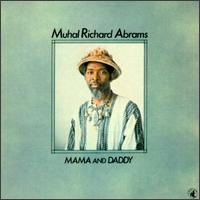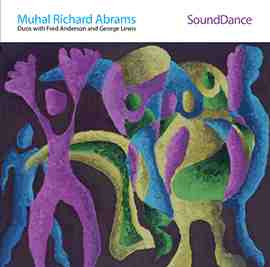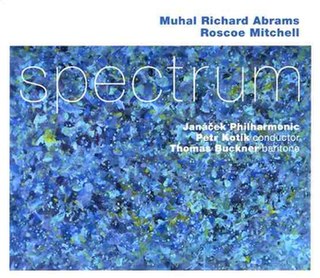Avant-garde jazz is a style of music and improvisation that combines avant-garde art music and composition with jazz. It originated in the early 1950s and developed through to the late 1960s. Originally synonymous with free jazz, much avant-garde jazz was distinct from that style.

Anthony Braxton is an American experimental composer, educator, music theorist, improviser and multi-instrumentalist who is best known for playing saxophones, particularly the alto. Braxton grew up on the South Side of Chicago, Illinois, and was a key early member of the Association for the Advancement of Creative Musicians. He received great acclaim for his 1969 double-LP record For Alto, the first full-length album of solo saxophone music.

Muhal Richard Abrams was an American educator, administrator, composer, arranger, clarinetist, cellist, and jazz pianist in the free jazz medium. He recorded and toured the United States, Canada and Europe with his orchestra, sextet, quartet, duo and as a solo pianist.
The Association for the Advancement of Creative Musicians (AACM) is a nonprofit organization, founded in 1965 in Chicago by pianist Muhal Richard Abrams, pianist Jodie Christian, drummer Steve McCall, and composer Phil Cohran. The AACM is devoted "to nurturing, performing, and recording serious, original music," according to its charter. It supports and encourages jazz performers, composers and educators. Although founded in the jazz tradition, the group's outreach and influence has, according to Larry Blumenfeld, "touched nearly all corners of modern music."

The Art Ensemble of Chicago is an avant-garde jazz group that grew out of the Association for the Advancement of Creative Musicians (AACM) in the late 1960s. The ensemble integrates many jazz styles and plays many instruments, including "little instruments": bells, bicycle horns, birthday party noisemakers, wind chimes, and various forms of percussion. The musicians would wear costumes and face paint while performing. These characteristics combined to make the ensemble's performances both aural and visual. While playing in Europe in 1969, five hundred instruments were used.

Roscoe Mitchell is an American composer, jazz instrumentalist, and educator, known for being "a technically superb – if idiosyncratic – saxophonist". The Penguin Guide to Jazz described him as "one of the key figures" in avant-garde jazz; All About Jazz stated in 2004 that he had been "at the forefront of modern music" for more than 35 years. Critic Jon Pareles in The New York Times has mentioned that Mitchell "qualifies as an iconoclast". In addition to his own work as a bandleader, Mitchell is known for cofounding the Art Ensemble of Chicago and the Association for the Advancement of Creative Musicians (AACM).

George Emanuel Lewis is an American composer, performer, and scholar of experimental music. He has been a member of the Association for the Advancement of Creative Musicians (AACM) since 1971, when he joined the organization at the age of 19. He is renowned for his work as an improvising trombonist and considered a pioneer of computer music, which he began pursuing in the late 1970s; in the 1980s he created Voyager, an improvising software he has used in interactive performances. Lewis's many honors include a MacArthur Fellowship and a Guggenheim Fellowship, and his book A Power Stronger Than Itself: The AACM and American Experimental Music received the American Book Award. Lewis is the Edwin H. Case Professor of American Music, Composition & Historical Musicology at Columbia University.
Joseph Jarman was an American jazz musician, composer, poet, and Shinshu Buddhist priest. He was one of the first members of the Association for the Advancement of Creative Musicians and a member of the Art Ensemble of Chicago.
Douglas R. Ewart is a Jamaican multi-instrumentalist and instrument builder. He plays sopranino and alto saxophones, clarinets, bassoon, flute, bamboo flutes, and didgeridoo; as well as Rastafarian hand drums.
Kalaparusha Maurice McIntyre was an American free jazz tenor saxophonist.
Steve McCall was an American jazz drummer.

Sound is the debut album by free jazz saxophonist Roscoe Mitchell, recorded in 1966 and released on the Delmark label. It features performances by Mitchell, Lester Bowie, Malachi Favors, Maurice McIntyre, Lester Lashley and Alvin Fielder. The CD reissue includes two takes of "Sound", which were edited together to form the original LP version, and an alternative take of "Ornette".

Fanfare for the Warriors is a 1973 album by the Art Ensemble of Chicago first released on the Atlantic label. It features performances by Lester Bowie, Joseph Jarman, Roscoe Mitchell, Malachi Favors Maghostut and Don Moye along with AACM leader Muhal Richard Abrams.

Nonaah is a double album recorded in 1976-77 by Roscoe Mitchell. It was originally released on the Nessa label in 1977 and features solo, duo, trio and quartet performances by Mitchell, Anthony Braxton, Malachi Favors, Muhal Richard Abrams, George Lewis, Henry Threadgill, Joseph Jarman, and Wallace McMillan. The 2008 double CD reissue added five unreleased saxophone solos to the album.

Mama and Daddy is an album by Muhal Richard Abrams. It was released on the Italian Black Saint label in 1980 and features performances of four of Abrams' compositions by a big band.

Spihumonesty is an album by Muhal Richard Abrams, released on the Italian Black Saint label in 1979. It features performances by Abrams, George Lewis, Roscoe Mitchell, Amina Claudine Myers, Youseff Yancy, Leonard Jones, and Jay Clayton.

Roscoe Mitchell Quartet is an album by American jazz saxophonist Roscoe Mitchell recorded in 1975 and released on the Canadian Sackville label.

Made in Chicago is a live album by drummer and composer Jack DeJohnette recorded at the 35th Chicago Jazz Festival on August 29, 2013 and released on ECM in March 2015. The quintet features fellow Chicagoan musicians pianist Muhal Richard Abrams, bassist Larry Gray and saxophonists Roscoe Mitchell and Henry Threadgill—a reunion of DeJohnette with colleagues from Chicago's Association for the Advancement of Creative Musicians.

SoundDance is a two-disc live album by pianist Muhal Richard Abrams. It was recorded at AACM concerts in New York City in October 2009 and September 2010, and released by Pi Recordings in 2011.

Spectrum is a live album by pianist and composer Muhal Richard Abrams and saxophonist and composer Roscoe Mitchell. It was recorded at Philharmonic Hall in Ostrava, Czech Republic, and was released by Mutable Music in 2009. The album begins with an improvised duet by Abrams and Mitchell titled "Romu." This is followed by Mitchell's three-part "Non-Cognitive Aspects of the City" for baritone and orchestra, commissioned by Mutable Music, with a text by Joseph Jarman, and featuring singer Thomas Buckner with the Janáček Philharmonic Orchestra. The album concludes with the Janáček Philharmonic's performance of Abrams's "Mergertone" for orchestra, commissioned by the Ostrava Center for New Music and premiered at the opening concert of the Ostrava Days 2007 festival. Both orchestral works were conducted by Petr Kotik.














